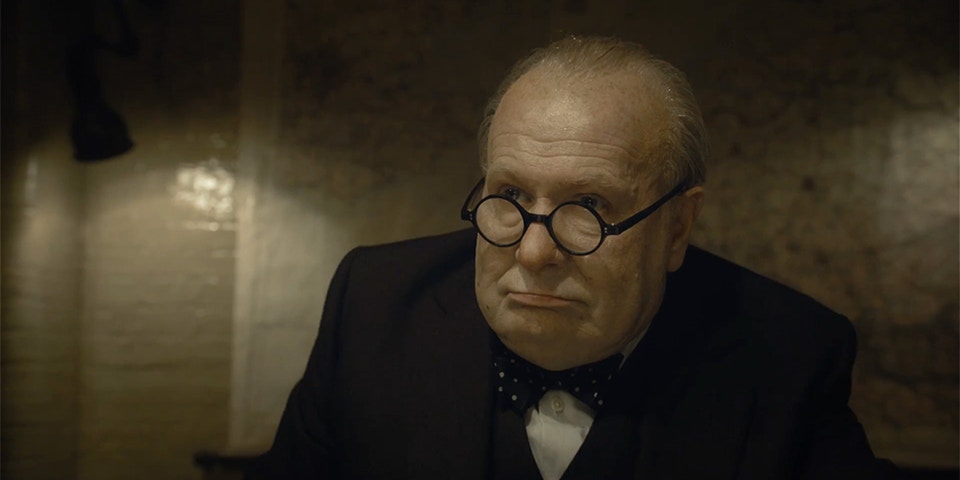
A less-remembered moment in human history makes for a great story in Joe Wright’s Darkest Hour, which takes place entirely in May 1940, the period after the German blitzkrieg through the Low Countries on the way to Paris and just before the Dunkirk evacuation.
It’s not always easy today to remember that there was a time when it appeared that Hitler would win WW II. In May 1940, the Nazi empire had swallowed essentially all of Central and Western Europe except for France, which was teetering on the verge of imminent surrender. The entire British Army was trapped, surrounded on a French beach across the Channel.
The UK was both damaged and entirely isolated. Stalin had split Poland with Hitler, and it was over a year before Hitler’s invasion of the USSR. It was also 19 months before Pearl Harbor brought the US into the war. With no hope of external help, Winston Churchill even publicly contemplated the war being carried on by the Commonwealth nations after the German conquest and occupation of the island of Britain.
in Darkest Hours, Winston Churchill (Gary Oldman in a superb, Oscar-worthy performance) has just become Prime Minister. At the time, Churchill was a 66-year-old who had peaked at forty. He had been a superstar daredevil in his twenties who squandered his celebrity in a career dotted by Bad Gambles, where he had repeatedly gone All In and lost all of his chips. By 1940 he was well-known for engineering a horrific military disaster at Gallipoli in WW I and for a series of political party changes. Not the confidence-inspiring figure we think of today.
So in this situation, what to do? One option was to embark on what one could rationally conclude would be a suicidal course of waging aggressive war and risking obliteration. Another option would be to negotiate the most favorable surrender with Nazi Germany. No good choices here.
If Churchill begins trash talking the Germans just before their invasion, is that delusional or intellectually dishonest? Or a moment of inspired leadership?
Churchill’s selection as Prime Minister was forced on the former Prime Minister Neville Chamberlain and his top foreign affairs expert Lord Halifax, and the two were understandably concerned that Churchill might be leading the nation to its (literal) ruin. They lay a trap, but great politicians like Lincoln and Churchill do not let themselves be trapped.
The core of Darkest Hour is Churchill probing for a solution while under the most oppressive stress and pressure. In Darkest Hour, his outsized personality and eccentricities sprinkle the story with humor. Churchill, well-known for consuming a bottle of champagne with both lunch and dinner and working, slugging down brandy and whisky, late into the night, is shown having breakfast eggs with champagne and whisky. When the King, at lunch, asks him, “How do you manage drinking during the day?”, Winston replies, “Practice”.
Oldman is as good as any of the fine actors who have played Churchill. Kristin Scott-Thomas is especially excellent (no surprise here) as Churchill’s wife of then 32 years, Clementine. Lily James (Lady Rose in Downton Abbey) is appealing as the fictional secretary through whose eyes the audience sees the private Churchill. Ben Mendelsohn is very good as King George VI, who has watched Churchill’s career to date askance. Stephen Dillane is particularly good as Lord Halifax,
There is one especially touching, but wholly phony scene with a “poll” in the Underground, but, other than that, Darkest Hour is very solid history.
Joe Wright is a fine director, and, here, has selected a moment in history that has sparked an exceptionally good movie. I saw Darkest Hours with a multiplex audience, which erupted into a smattering of applause at the end.
